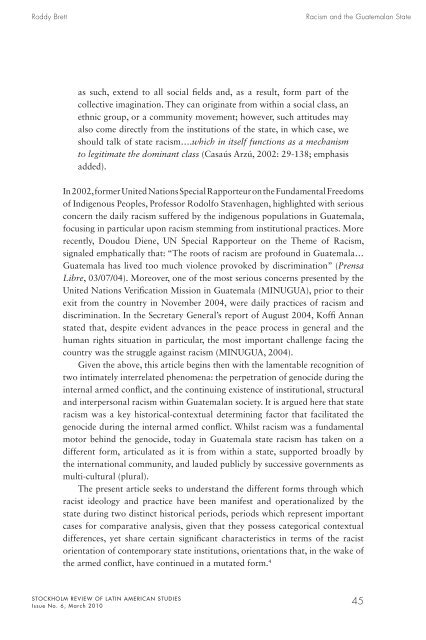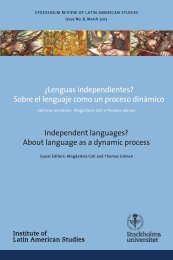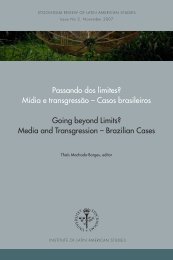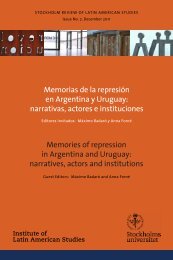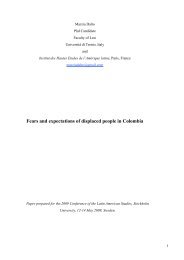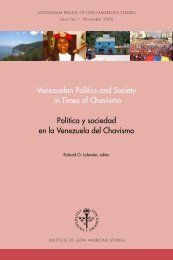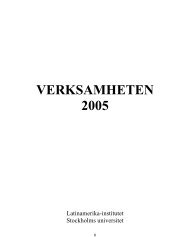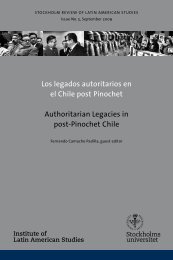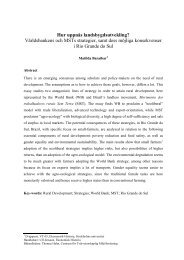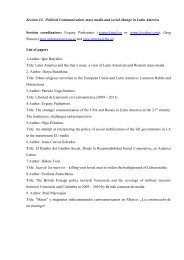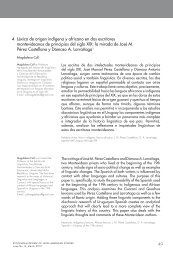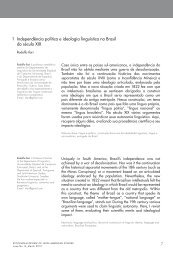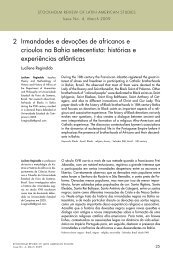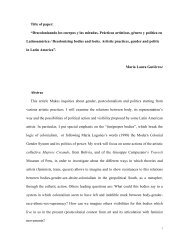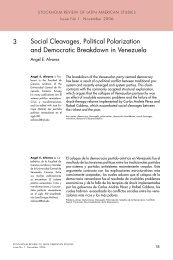Racism and Ethnic Discrimination in Guatemala - Institute of Latin ...
Racism and Ethnic Discrimination in Guatemala - Institute of Latin ...
Racism and Ethnic Discrimination in Guatemala - Institute of Latin ...
- No tags were found...
Create successful ePaper yourself
Turn your PDF publications into a flip-book with our unique Google optimized e-Paper software.
Roddy Brett<strong>Racism</strong> <strong>and</strong> the <strong>Guatemala</strong>n Stateas such, extend to all social fields <strong>and</strong>, as a result, form part <strong>of</strong> thecollective imag<strong>in</strong>ation. They can orig<strong>in</strong>ate from with<strong>in</strong> a social class, anethnic group, or a community movement; however, such attitudes mayalso come directly from the <strong>in</strong>stitutions <strong>of</strong> the state, <strong>in</strong> which case, weshould talk <strong>of</strong> state racism….which <strong>in</strong> itself functions as a mechanismto legitimate the dom<strong>in</strong>ant class (Casaús Arzú, 2002: 29-138; emphasisadded).In 2002, former United Nations Special Rapporteur on the Fundamental Freedoms<strong>of</strong> Indigenous Peoples, Pr<strong>of</strong>essor Rodolfo Stavenhagen, highlighted with seriousconcern the daily racism suffered by the <strong>in</strong>digenous populations <strong>in</strong> <strong>Guatemala</strong>,focus<strong>in</strong>g <strong>in</strong> particular upon racism stemm<strong>in</strong>g from <strong>in</strong>stitutional practices. Morerecently, Doudou Diene, UN Special Rapporteur on the Theme <strong>of</strong> <strong>Racism</strong>,signaled emphatically that: “The roots <strong>of</strong> racism are pr<strong>of</strong>ound <strong>in</strong> <strong>Guatemala</strong>…<strong>Guatemala</strong> has lived too much violence provoked by discrim<strong>in</strong>ation” (PrensaLibre, 03/07/04). Moreover, one <strong>of</strong> the most serious concerns presented by theUnited Nations Verification Mission <strong>in</strong> <strong>Guatemala</strong> (MINUGUA), prior to theirexit from the country <strong>in</strong> November 2004, were daily practices <strong>of</strong> racism <strong>and</strong>discrim<strong>in</strong>ation. In the Secretary General’s report <strong>of</strong> August 2004, K<strong>of</strong>fi Annanstated that, despite evident advances <strong>in</strong> the peace process <strong>in</strong> general <strong>and</strong> thehuman rights situation <strong>in</strong> particular, the most important challenge fac<strong>in</strong>g thecountry was the struggle aga<strong>in</strong>st racism (MINUGUA, 2004).Given the above, this article beg<strong>in</strong>s then with the lamentable recognition <strong>of</strong>two <strong>in</strong>timately <strong>in</strong>terrelated phenomena: the perpetration <strong>of</strong> genocide dur<strong>in</strong>g the<strong>in</strong>ternal armed conflict, <strong>and</strong> the cont<strong>in</strong>u<strong>in</strong>g existence <strong>of</strong> <strong>in</strong>stitutional, structural<strong>and</strong> <strong>in</strong>terpersonal racism with<strong>in</strong> <strong>Guatemala</strong>n society. It is argued here that stateracism was a key historical-contextual determ<strong>in</strong><strong>in</strong>g factor that facilitated thegenocide dur<strong>in</strong>g the <strong>in</strong>ternal armed conflict. Whilst racism was a fundamentalmotor beh<strong>in</strong>d the genocide, today <strong>in</strong> <strong>Guatemala</strong> state racism has taken on adifferent form, articulated as it is from with<strong>in</strong> a state, supported broadly bythe <strong>in</strong>ternational community, <strong>and</strong> lauded publicly by successive governments asmulti-cultural (plural).The present article seeks to underst<strong>and</strong> the different forms through whichracist ideology <strong>and</strong> practice have been manifest <strong>and</strong> operationalized by thestate dur<strong>in</strong>g two dist<strong>in</strong>ct historical periods, periods which represent importantcases for comparative analysis, given that they possess categorical contextualdifferences, yet share certa<strong>in</strong> significant characteristics <strong>in</strong> terms <strong>of</strong> the racistorientation <strong>of</strong> contemporary state <strong>in</strong>stitutions, orientations that, <strong>in</strong> the wake <strong>of</strong>the armed conflict, have cont<strong>in</strong>ued <strong>in</strong> a mutated form. 4STOCKHOLM REVIEW OF LATIN AMERICAN STUDIESIssue No. 6, March 201045


